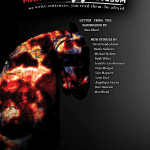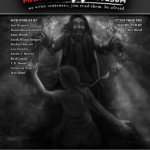Despite his vocation, Titus Gondelbert had no fondness for corpses. Every Sunday there was a new batch: cut down from the gallows, beheaded in the public square, or all those heads that were stuck on spikes outside the gate. They had to be sent onward in creative ways, in order for the public to draw the appropriate warnings from the executions. Murderers, fornicators, stealers of other men’s sheep: this is what will happen to you should you stray.
It made for a mess afterward, though, when the entertainment was over and justice done. Someone had to cut them all down, scoop up the bits, and cart the debris off for disposal.
It was steady work.
Titus sang a song as he drove his wagon down the south fork. So far, none of the bodies had fallen off the back, and he would arrive soon. He had begun digging the grave yesterday, and had planned to finish it, but something else had come up; he could not remember precisely what. But there would be more digging today—and the sun hot, too. Probably that was why he had quit yesterday, he reflected, pausing in his song. This heat. He had to get the hole down deep enough to hide this batch, though, or he could lose his contract for the work. That was the agreement: they had to all be underground by sundown.
Disgusted, he spit into the dust at the side of the road, and then regretted it. He was parched, and he damned his past self for not finishing this task yesterday. Now he would not only have to dig, but dump the corpses and fill in the hole after them. He didn’t deserve this life.
Finally, he pulled the horse up and settled the wagon. Swearing, Titus took up his shovel, and began to dig as the sun began its arc overhead. Crows gathered while he worked, eager to get at the things under the blanket on the back of the cart. They had been following him all day. They know me, he thought, heaving and sputtering as he attempted to move the heavy earth. Damn all crows.
Not an hour passed, and he looked back at the city walls, wondering if they could see him from there. But surely no one was watching. He could afford a break—he had to break, in fact, or he would join the corpses in the hole before sundown. Stumbling back to the wagon, he eased the blanket aside, scattering the crows, and gingerly removed a corked jug that rested close to a pale hand. Hastily he covered the hand, and found a tree to sit under. For an hour he rested, and drank, sometimes cursing the magistrates out loud, sometimes singing a beloved tune, and at times reflecting silently.
The sun continued on overhead.
Best to get back at it, he thought, eventually rising with some difficulty. The corpses would not wait forever. Laughing at that, he returned to the pitiful hole, and for a time attacked it with renewed energy. But soon he was gasping for air, and using the shovel to keep himself upright. The crows laughed at him.
To hell with them, he thought, crows and criminals alike.
Staggering back to the wagon, he threw the blanket aside with effort, and, trying not to look, he took inventory of the bodies in the wagon. Six of them: a very bad week indeed. Two small ones, he noted, and one old one. Those were easiest and would go first. It took him half an hour more to dump them all in a heap in the hole, as the crows went mad all about him. Last to go was a well-dressed man of middle years: this one was tall, healthy looking even in death. And handsome—Titus had to admit it. In any case, this one joined the others without complaint, as Titus staggered around for his shovel.
So damned hot. Why could these fools not be sent off onto the river in flaming barges, he thought, as had apparently been done in times of old?
At last the job was done. Or well enough, he thought, exhausted. No one would come looking. Heaving and sputtering, he tossed the shovel in back of the wagon, waking the old horse. For a second, Titus thought about leaving, but knew he could not manage it. Not now. So instead he took up his jug again, staggered back into the stretching shadows, and collapsed. Rolling to his side, he drank, the fiery liquid burning his throat. Then he drank more, his sweat drenching the earth.
At some point he must have dozed, because when he opened his eyes again it was dark. The crows were gone, the moon was overhead, and the air was cold. A fog had rolled in from somewhere, and Titus sat up sharply, certain he had heard a sound. The wagon—where was it? Rolling and flailing, he rose to his feet, staring about, his sudden panting drowning out whatever sound had wakened him. An animal, come to nose about the grave …
It came again, from close by. Slowly, knowing where he had to look, he turned his head toward the small mound of dirt he had left earlier. But there was nothing there, no slavering creature digging in the pit in the moonlight. Yet, that was where the sound had come from. He heard it again, a groaning of some sort, and he thought he could feel it through his boots.
Yes, it was coming from the pit. He froze, and felt a sensation like slivers of ice shooting through his veins as he stared. The earth stirred, like a creature burrowing. Something was pushing its way upward, and as he watched, a hand emerged from the ground, pale and white; it flexed and grasped, slender fingers moving. Then another hand, reaching skyward. So alive.
Titus ran. Forgetting the horse and wagon he pounded off down the road, screaming, not looking back. It was two miles to town. Could he run so far? Not likely, but he would make an exception tonight. Praying silently, he sprinted onward, tripping and stumbling in the dark before he had gone even a dozen steps. From behind him he heard a long cry, like a wail and a sob, and he screamed aloud in terror, knowing that it was already too late.
# # #
This is not precisely how it happened, of course, but it is dramatic, to begin that way. I have added some color, as needed—the crows, the drunken grave-digger. I cannot be certain about all of that, you understand, because it was me who dug his way out of the ground that night. You saw me first in the back of the wagon: tall, handsome even in death, with fingers long and fine like an artist.
And yes, the grave-digger made it back to town—or made it somewhere. I did not eat him, if that is what you imagine. I was too busy clawing my way out of the ground—yet again—in order to return here for breakfast with the jailer. I must have been a sight making my way through town, all covered in dirt and my neck still purple from the hanging. Eventually I made it back though, and drew up a nice bath to clean the dirt off, before donning clean clothes. It gets bloody exhausting, all this executioning business, I can tell you.
Edmuir had the chess board waiting when I returned, and without comment I sat down to play the white side. My army was missing three pieces: one knight had been stomped through a grate in the cell floor, a rook fired out a window on a separate occasion, and one pawn simply confiscated. This did not make the match quite even, however, and I took up my lute, thinking to compose while we played.
A dark, haunting melody filled the little jail cell, as Edmuir made his first two moves. This was the agreed rule: one move for me, for each two for him, and he was allowed to reverse those moves when necessary. Watching only from the corner of my eye, I could not help grimacing.
“The bishop can only move diagonally,” I said gently. “The move you have made seems to combine the movement of a rook with that of a knight. It is nothing known to man, Edmuir. Or will we call that both of your two moves?”
Silently he pulled his oversized hat lower onto his head, but said nothing. I strummed a minor chord.
“What do you feel best rhymes with ‘dead man’, Edmuir?” I inquired, but was brought up short by a shape in the doorway before the verse could continue. Recognizing one of the magistrates, I stilled the lute but kept it on my lap.
“Justice Crow,” I greeted him. For his part, Crow just grunted, and I saw that he was studying my recently broken neck through the bars of the cell. “Join us, please,” I said politely, growing uncomfortable under his study. “The door is open.” He blinked in surprise and pushed at the door of the jail cell, which swung open obligingly.
“This is not an ideal way to contain the prisoners, Edmuir,” he stated reprovingly, but Edmuir ignored him.
“He is busy with the chess game,” I explained, gesturing. “You are well, I trust, Justice Crow?”
“I am,” he replied, circling the table warily. “And I see you are, as well, Mister de Vere. Your neck looks quite fine, in fact—somewhat purple, alas, but not broken in two any longer. Very much in one piece, I would say.”
“Yes, and thank you for noticing,” I said self-consciously, resisting the urge to pull my collar up. The bruises would be appalling for a day or two, and I must confess I am a vain man. “Would you like to hear a song, Justice?”
“Assuredly not. No, I have come about this situation of yours, de Vere. It cannot go on. It is most upsetting—embarrassing, even. You understand that, while you are walking around freely, it appears to the townsfolk as though we are incapable of protecting them. And they will ask why you, creature that you are, are sitting here safely in their jail, eating food they have paid for while being watched over by guards at night. Soon, they will wonder why they are paying taxes at all, you understand, and we can’t have that—that is the last thing we can have, in fact.”
“I quite understand,” I said agreeably, knowing where this was going.
“What I don’t understand,” he continued, “is why you cannot simply stay dead, like the rest of them.” He shook his head, and I saw that he was truly baffled, and I had to resist the urge to enlighten him. “We have hanged you three times this month alone, Mister de Vere. The previous record for hangings by one individual was only two, and that was an unfortunate accident. In Lancashire, you were beheaded; upcountry, you were boiled in acid; while the fishermen off the coast stretched you on a makeshift rack and hurled your corpse out into the ocean from a catapult. I would imagine you would have been eaten by sharks once in the ocean. Further, I have consulted the historical record and discovered that in previous centuries you were disembowelled, crushed to death under boulders, drowned, and set on fire—mostly on separate occasions, but not in all cases. The setting on fire occurred when you were exposed to sunlight, and spontaneously burst into flame on your own, apparently. Yet you appeared two days later, at a country fair, with nothing worse than a mild sunburn to show for it. It is most disturbing, Mister de Vere.”
“And not just for you,” I agreed sincerely. “There have been other occurrences, but they are too numerous to list, really, and I think you have the gist of it there. I also am not happy with the situation, Justice, you can be sure of that.”
“Understandable,” he nodded. “And yet you insist on getting yourself into further trouble, each time you have been unsuccessfully … disposed of. Throwing bodies onto spikes seems to be a favorite pastime of yours, as is the murder of livestock, not to mention your fondness for the women hereabouts. Farmers daughters, maidens, goodwives, widows—is there nothing you will stop at, sir?”
I strummed a chord thoughtfully. “The widows, at least, must be fair game?” I suggested at last. “The goats I will not argue about, but surely the widows can speak for themselves?”
“Normally I would agree,” he conceded. “But not when they are drained of all the blood in their bodies and left out for the neighbors to find. That is most indecent. The community expects better of you, you realize.”
“Yes, yes,” I muttered. There was no point arguing this, though I could not see where he was going with the whole discussion.
“This is out of my hands now, de Vere,” the Justice concluded. “It is beyond earthly powers entirely, in fact. The church has been consulted—their best exorcists know of you, and have refused to come here. So we have called upon someone higher up. A saint, no less.”
Edmuir slid a pawn six squares diagonally across the board, then made hopping motions with it, moving it four squares to the right. “Checkmate,” he said.
Something chilled me, though no blood moved through my ancient veins.
“What saint is this you speak of?” I asked with a voice that sounded shaky.
A voice came from the shadows beyond the cell door.
“Saint Genevieve, of the Berkshereshire.”
She had been hiding there in the shadows, and despite my ability to see in the dark I had not noticed her. It seemed impossible that I, great lord of darkness, had failed to sense her presence. Yet I saw her now, this child Genevieve. She must have been only a dozen years old. (Young, for a saint, I will grant). She would have been adorable if not for the saintly part.
“I will be leaving here,” I told them both. “Immediately. I have served my punishment—you said so yourself. You have no business hanging me a fourth time, or whatever it is that this child has planned. Surely there is some statute of limitations on my crimes, after all? I cannot die, Justice. And you will all regret it if I am detained any longer. Tonight after dark I will take on the form of a cloud of poisonous gas—”
He slipped out the door, and locked it. Unfortunate, as I knew that Edmuir did not carry a key with him.
“Tomorrow,” Saint Genevieve said calmly. “We will come for you at dawn, and you will be moved to the cellar below this building. There you will be stripped down to your underwear, and strapped to a table that we have prepared for you. You will be bound, and the ritual performed. Rest well, creature. This is your final night in the shadows.”
I drew myself up to my full height. “I am one of the twelve lords of darkness. I can never be bound, nor stripped to my underwear, and the likes of you will never strap me to any table. You are warned.”
# # #
The next morning found me in the cellar, stripped to my underwear, and strapped to an enormous wooden table. Much profanity issued from my lips, as they tied me. Their mothers were cursed and their fathers denigrated in the foulest of terms—even distant relatives were accused of obscene and unlikely acts. Threats were issued. Dire threats, of twisted and unheard of punishments. My revenge would be a horrible thing. They must untie me if they wished to avoid those outcomes.
When they ignored me, I turned to begging. They must release me, I told them; there was good I could do in this world. Would do. Surely they could see that, and did their god not preach it as well?
Still they ignored me, the three of them, even Edmuir, who I admit I counted as my closest friend in the world at that time. The saint in particular was unmoved by my pleas, and I cursed her anew.
Serene, in saintly silence, she took a seat beside the table, and closed her eyes.
Of the ritual, I remember little, and some of what I do recall only shames me. I cannot bring myself to transcribe it all here. But I understand well enough what happened, and will explain it as much as I can so the record will remain truthful.
They took me back in time. One minute I was watching the saint cry over me, and the next, when her tears contacted my body, I was removed somehow from that little room under the jail. I saw again my aristocratic father, and my mother who was little more than a hostage to him. I saw myself, as well, and it was this last person that I did not recognize. Centuries had passed, I will grant, but it was not just that. Where I had become used to a dead, colorless world, these memories and ghosts were alive somehow. Blood had coursed through my veins, in those days of my childhood, and it disoriented my mind to see it again. To live it again.
But it did not last.
The plague came to that world as I watched, and took away my parents, and for a time I remained in the great house, alone with them while they decayed. But then I also became ill, and removed myself to bed to die. A priest came before that could happen, and nursed me back to health. He performed strange rituals over me, that holy man, some sort of dark magic which my mind had long since forgotten. He spoke a language I could not recall, and strange, hoofed creatures danced about the room, walking on two feet. Eventually I recovered, and lay thin and starving in the bed, alone with the priest in the mansion.
I said I would not tell it all, but you might guess what happened next. I did, in fact, murder the priest, once I realized that he was not a priest at all. I did it by driving a dagger into his neck, and he was a long while in dying. I saw again the look of astonishment on his aged face, as I struggled to force the knife into him, and his glassy eyes as he watched me licking up the blood. Should I be ashamed of that now? I am no longer sure.
As I watched all this, the saint also watched.
It was with that first taste of blood that the color began to drain out of the world. The village below had been decimated by plague, and there were corpses lying in the streets and in the yards when I visited there. I knocked on doors and entered homes, and found the fallen on the floors, or sitting lifeless at tables and bedsides. Finally I met a young girl (still alive), and she asked my help. I told her to visit me at the mansion, and I see now that I did not actually mean her harm at that time. I was scared myself, and planned to aid her in some way, though that is not what happened. I cried when the color drained out of the girl, both on that day long ago, and also in the room below the jail.
Saint Genevieve cried also.
After a time I left the empty mansion and the village, and I wandered. The plague had been everywhere, and the countryside was an apocalypse. This is when I first fed on livestock—that crime that the jailer had mentioned. I hated it; it shamed me even back then, when I was dirty and matted and starving. But it was necessary if I was not to feed on the people, and I became used to it, and took no care to hide myself. Soon I was hunted, and learned how to defend myself. I hated the farmers, for what they forced me to do to them.
Again and again.
There were others after the girl—too many to count. Some I knew, some I preferred not to know, but I fed and wandered and hid. Seen in that way, the years rolling past, I watched the color and the life go out of the world until everything became a lifeless shadow-play. I realized finally that I was dead, somehow, yet stubbornly refused to actually die. I turned myself in to local authorities, confessed my sins, and paid the price for it. I was hung, beheaded—well, there is no need to repeat that part of the story.
But always I would find myself crawling out of a grave, or from some bonfire; the great lord of the damned, dead but still alive. It exhausted me to see it all again, and I was embarrassed even to think that once I had thought I could end all this myself, at the end of the headman’s axe.
I railed at the little girl, in the cellar. Called her names. This story was mine, and she was living it now, and it humiliated me to have her see the truth of it all. What right had she to judge me? But when I looked at her face, all I saw there was a question that I could not understand or answer.
# # #
Justice Crow stayed with me until I woke again in the cellar. Saint Genevieve was gone.
“It failed?” was the first thing I said, though I knew that something had changed. “I am free to return to my cell, I presume?”
He looked at me curiously. “You are,” he said. “But only to say goodbye to Edmuir. Then you must leave. Your punishment has been carried out; my job was to hang you, and that is done. Saint Genevieve says you can be safely freed now, so I suggest you go, Mister de Vere.”
This was not what I had expected. I had been exorcised previously, of course, but those had usually ended with me eating the exorcist and assembled do-gooders. So it was with some trepidation that I left the cellar and walked up to my little jail cell on the main floor. Edmuir was moping in the cell, staring down at the assembled chess pieces. It took me seconds to collect my things for leaving.
“I owe you this,” Edmuir said suddenly, as I paused in the doorway. He held out coins. “Your winnings, for cards.”
“I cheated,” I admitted. “You owe me nothing.”
“You cheated?” he repeated dumbly.
“Yes. I am a cheater, Edmuir. Hadn’t you noticed?”
He grunted, but continued to offer the money. “Take it anyway,” he said. “You’ll need it out there.”
Slowly I accepted the coins, strangely touched by this man who I had come to view almost as a sort of pet during my stay in the jail. “I’ll return,” I said slowly, but he laughed.
“I hope not.”
“Well.”
When I reached the door of the jail cell, I paused, but could not read his expression and so said nothing more. As I turned away, I swung the cell door shut, as a sort of joke, and left him standing there alone inside the little cell.
# # #
I was not recognized when I walked out into the town. And I did not recognize the town, either, though I had been there countless times before my most recent hangings. Something was different, and though I could not put my finger on it at first, I knew I had the saint to blame for it. It came to me at last when I passed a street vendor, who was smoking some godforsaken lump of meat over a flame and shouting into the crowd. When I realized that I could smell the smoke, I stopped, and looked back. Mistaking this for interest, the man shouted and called after me, poking at the smoking meat with a stick. I could smell the meat, also, I realized then.
Moving on, uncertain now and frowning, I put some distance between myself and the vendor. But I smelled other things. Worse, I could see things that I could not remember seeing before. The color of a person’s eyes, the expression on their face, the blowing wisps of a child’s hair as she crossed across the street in front of me. The people were alive again. I had seen this before—long ago. A woman stepped aside in front of me, and I noted the color in her cheek as she nodded at me. I nodded back, astounded.
Somehow my sentence, at last, had been served. How could that be? It was impossible that the scales had been balanced, after so long and all I had done. The saint had seen it, and must have known: I could never be redeemed. Yet one thing was clear: I was alive again. They had sentenced me to death at least a hundred times, and to most of those I had gone willingly, but somehow now I had been sentenced to something else. To life. Which punishment was worse? It frightened me, I must admit, to know that the only existence I could remember was now over. Where others feared death, it seemed I feared living.
Dazed, I walked on, breathing it in. There was blood moving in me; my heart beat in my chest again.
I was alive. What would I do with it this time?
I stopped when I saw a small shrine beside the road, noted the flowers, some scattered coins, the carving of Saint Genevieve. Humbly, I reached into my pocket for the coins Edmuir had given me, and I dropped them into the little tray.
A road led out of town, and I could see a wagon making its way down the path, and the sound of someone singing reaching me from even so far away. Another road ran off beside a river, and there was a sound like music in the rushing water. I could make my own way now, I thought. These roads were all mine to chose from.
And then, whistling a little tune of my own, I went on my way.
MIchael Vance (he/him) is a Canadian writer, and has published fiction in On Spec magazine, the Tesseracts anthology, BFS Horizons, and the Soul anthology.









